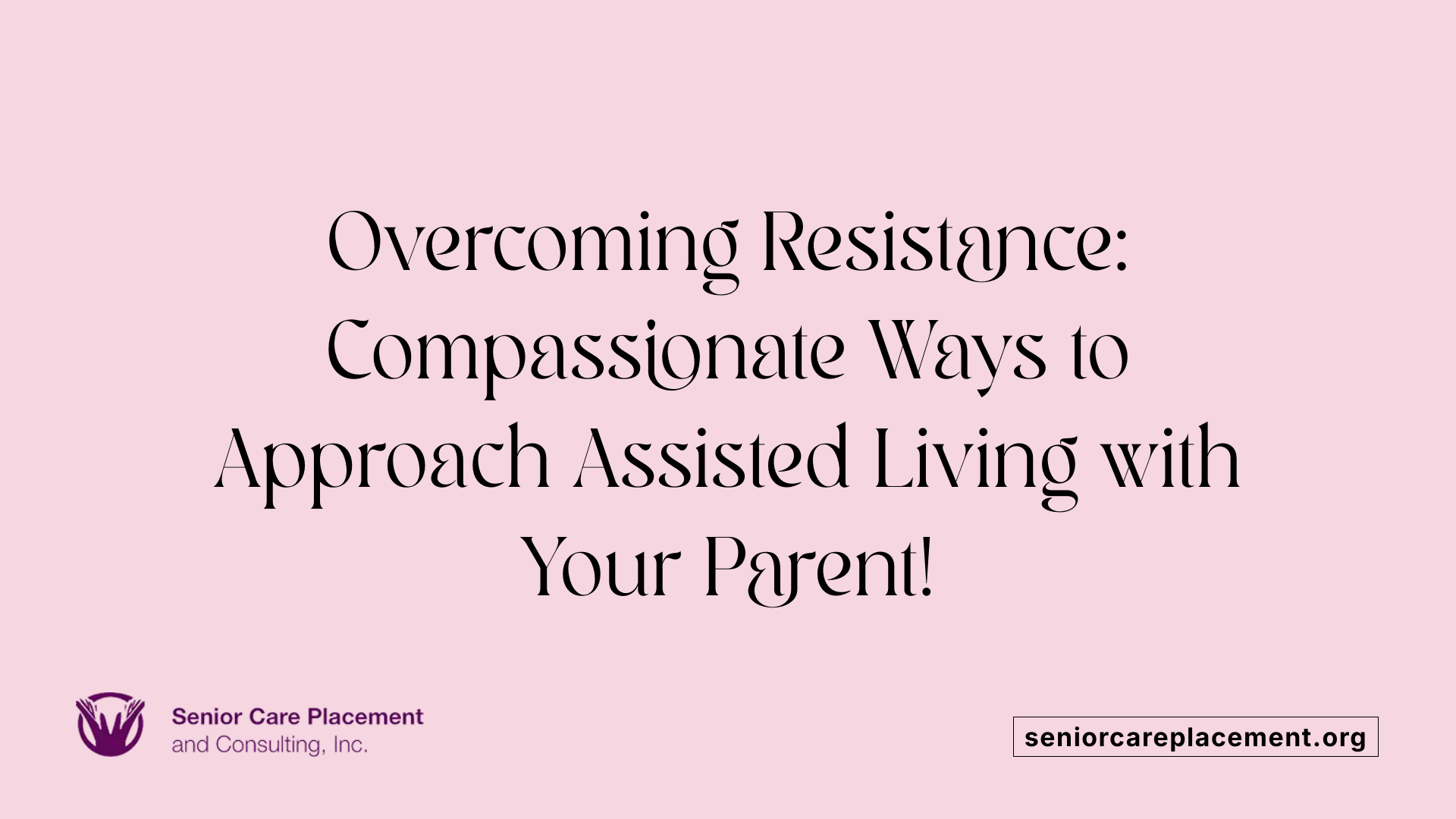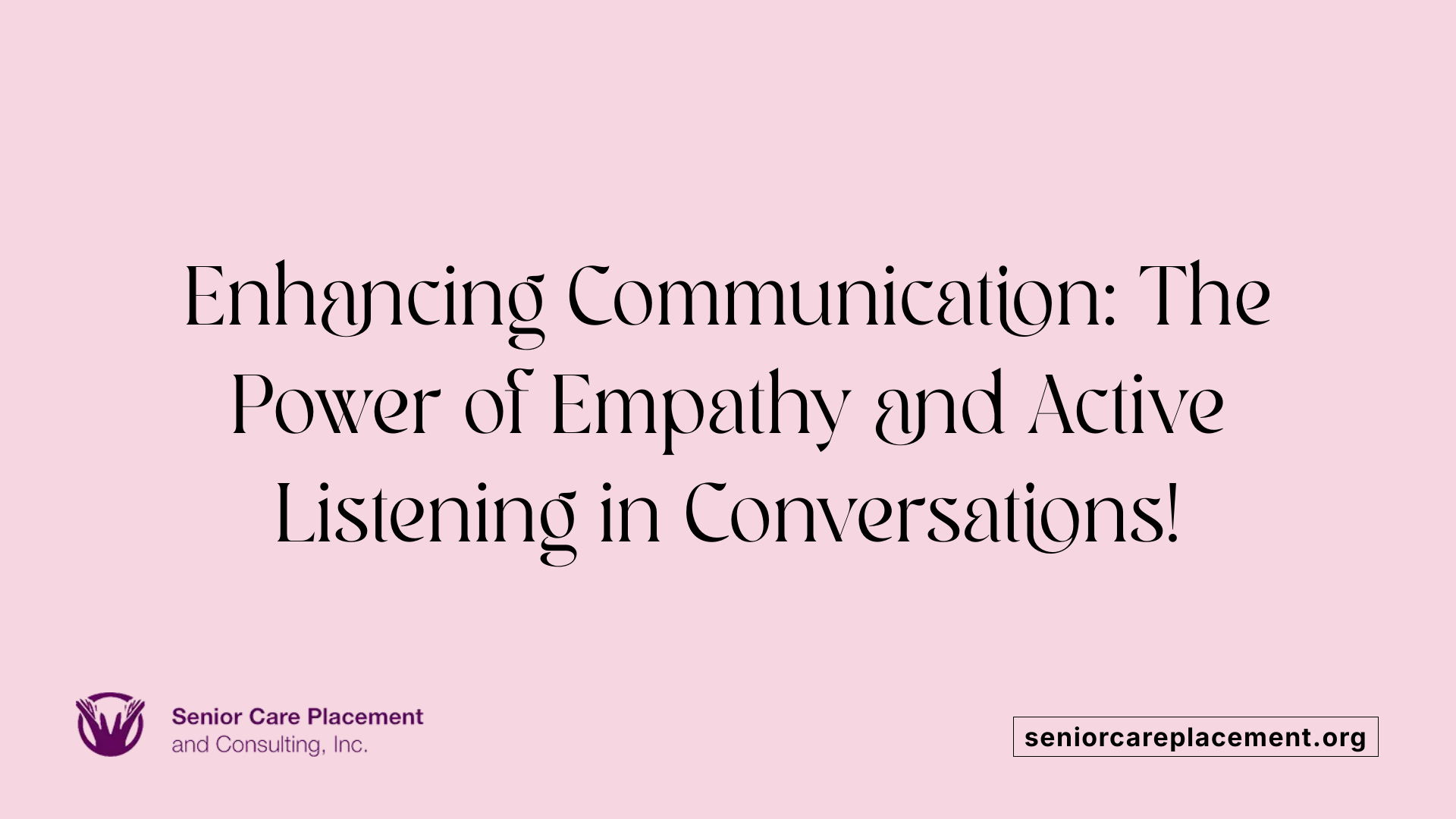How to Talk to Aging Parents About Assisted Living Options
Initiating Meaningful Conversations with Aging Parents About Assisted Living

Introduction
Discussing assisted living options with aging parents is a complex but necessary endeavor that requires sensitivity, patience, and a focus on mutual respect. Many families struggle with determining the right time to broach this subject and the best strategies to employ to ensure their loved ones' needs and preferences are met with compassion and understanding. This article provides essential guidance on how to begin these conversations, offer support, and make informed decisions collectively with your parents.
Initiating the Conversation Early

How do I initiate a conversation with my aging parents about moving to assisted living?
Starting the conversation about assisted living is a critical yet often delicate task. To initiate this dialogue, it’s best to do so when your parents are still healthy and independent. By addressing the topic early, families can discuss preferences and options well before any crisis compels action. This proactive approach allows for careful consideration rather than rushed decisions.
Involving Other Family Members
Involving siblings or other family members can bolster the discussion. Creating an atmosphere of support prevents feelings of isolation for your aging parents. This family involvement can also help mitigate any feelings of guilt or resistance they may have. A collaborative family meeting can foster open communication and accountability while ensuring your loved one feels included in the decision-making process.
Gathering Information on Options
Doing your homework on different assisted living options is crucial. Equip yourself with knowledge regarding local communities, the services they offer, and their costs. Prepare to discuss these options with your parents in a calm and comfortable environment. For example, understanding that assisted living is distinct from nursing homes can alleviate misconceptions.
In essence, initiate discussions with care, engage family members for support, and gather relevant information to help ease the transition to assisted living, ensuring that your loved ones feel heard and respected throughout the process.
Tips for Discussing the Need for Assisted Living

What are some tips for talking to parents about the need for assisted living?
Talking to parents about the need for assisted living can be a sensitive topic. Here are some effective strategies to navigate the discussion:
Start the Conversation Early
Begin discussing assisted living options before a crisis arises. This proactive approach allows for thoughtful planning and lets the conversation unfold naturally over time.Highlight the Benefits
Focus on the advantages of assisted living. Emphasize reduced maintenance, improved safety, social opportunities, and tailored support that enhances quality of life. Positively framing the discussion may reduce apprehension.Involve Family and Friends
Including trusted family members or friends can help provide additional support and comfort during conversations. Their presence can validate feelings and help ease anxiety about the change.Acknowledge Emotional Attachments
Recognize that moving may bring up feelings of loss regarding their home. Approach the conversation with empathy and respect, validating any fears or sadness they may express.Use Open Dialogue
Encourage an open and honest dialogue by actively listening to their concerns. Ask questions like "How do you feel about moving?" to engage them in the conversation, making them feel heard and respected.Consider Involving a Third Party
Sometimes, having a third-party professional, such as a doctor or geriatric care manager, can lend authority to the discussion, helping them understand the necessity of exploring assisted living.
By incorporating these strategies, families can facilitate a more productive and supportive dialogue about assisted living.
Addressing Parental Resistance to Assisted Living

How should I approach the topic if my elderly parent refuses assisted living?
Addressing a parent’s reluctance to move into assisted living requires a thoughtful and gradual approach. Start by initiating several calm discussions over time. This process allows your parent to digest the idea and share their feelings without feeling pressured.
Choosing the right environment is crucial. Seek a peaceful setting where your parent feels secure to express their concerns. Frame the conversation around the advantages of assisted living.
Benefits to Highlight:
- Enhanced Quality of Life: Explain how assisted living can support an active lifestyle with social activities and opportunities for engagement.
- Safety and Security: Discuss the 24/7 access to care, minimizing health-related risks and enhancing peace of mind for both parent and child.
- Maintenance-Free Living: Talk about freeing themselves of daily household burdens, leaving more time for enjoyable activities.
While presenting these benefits, it’s equally vital to ensure your parent feels heard. Use empathetic language such as, "What are your feelings about this?" and validate any concerns they share. This depth of communication fosters trust and may make the transition easier over time.
Ultimately, approach the conversation with respect and understanding. Be patient, leaving room for your parent to adjust to the idea of assisted living and to gradually articulate their thoughts and feelings as you move forward together.
Recognizing the Right Time for Assisted Living
When is it typically the right time for an elderly person to move to assisted living?
The decision for an elderly loved one to transition into assisted living often arises when they require help with multiple activities of daily living. This may include tasks such as bathing, dressing, or managing medication. For instance, recent statistics from the CDC indicate that approximately 13.4% of adults aged 75 and older required personal care assistance in 2023, showcasing the increased need for support within this demographic.
Recognizing signs such as weight loss, poor hygiene, or noticeable memory lapses can serve as crucial indicators that additional support is needed.
Involving family in discussions
Engaging family members early in the conversation about assisted living is vital. This involvement ensures that the preferences and concerns of the elderly parent are respected. Addressing fears and communicating the benefits, such as maintenance-free living and enhanced social opportunities, can help alleviate anxieties. It's essential to utilize an empathetic approach, making it clear that the intention is to improve the quality of life, not to undermine independence.
Highlighting benefits of timely communication
Timely discussions about assisted living can lighten the emotional weight involved in this transition. Open communication about the positive aspects of assisted living allows seniors to see it as an opportunity, rather than a loss. Familiarizing oneself with local care options ahead of these discussions can provide practical choices that build confidence in the decision-making process. When both parties approach this topic with patience and understanding, the transition to assisted living can become a supportive journey rather than an abrupt change.
Communicating with Dementia Patients About Assisted Living
How can I effectively communicate with a dementia patient about assisted living?
Effectively communicating with a dementia patient about assisted living requires a thoughtful, empathetic approach. Here are some essential strategies to ensure a productive conversation:
Choose Calm and Familiar Settings: Initiate discussions when the environment is peaceful and familiar. This creates a safe space where the individual feels at ease, reducing anxiety and promoting open dialogue.
Simplifying Language: Use clear, simple language and short sentences. Avoid complex terms that may confuse the patient. Highlight the benefits of assisted living, such as improved safety, social activities, and assistance with daily tasks, making these points easy to digest.
Involvement in Decisions: Whenever possible, include the individual in conversations about their care. Phrases like "What do you think?" or "How do you feel about this?" can help them feel valued and respected, easing feelings of loss associated with the transition.
Empathy is key; acknowledge their emotions about moving and reassure them of your support. Be prepared for resistance, and practice active listening by validating their feelings. If necessary, involve healthcare professionals or geriatric care managers to provide additional perspectives and reassure the patient of the benefits of assisted living.
The Importance of Timing in Sensitive Conversations
Choosing Stress-Free Moments for Discussions
Initiating conversations about assisted living can be challenging, especially when the topic evokes strong emotions. It's crucial to select moments free from stress, ensuring that both you and your aging parent can engage openly. Look for times when there are no pressing issues or distractions, allowing for a more relaxed dialogue.
Creating a Comfortable Discussion Atmosphere
A nurturing environment can significantly impact the quality of the conversation. Arrange discussions in private, comfortable spaces where your parent feels secure expressing their thoughts and feelings. This sense of safety encourages honest communication and shared decision-making.
Ensuring Ongoing Dialogues Rather Than One-Time Talks
Understanding that one conversation may not be sufficient is vital. Approach this topic as an ongoing dialogue over time rather than a single sit-down. Frequent discussions can help you and your parent process feelings and gradually work through any reservations they might have about assisted living. This method not only facilitates a more productive conversation but also respects your parent's autonomy while ensuring they feel supported throughout the decision-making process.
| Aspect | Importance | Tips |
|---|---|---|
| Timing | Choosing stress-free moments allows for better communication | Avoid urgent or emotional situations |
| Environment | A comfortable space fosters trust and openness | Ensure privacy and comfort |
| Ongoing conversations | Gradual discussions help parents process feelings | Plan multiple talks, building on each |
Empathy and Active Listening in Discussions

Empathizing with Parent's Fears and Anxieties
When initiating conversations about assisted living, it’s vital to approach the subject with empathy. Aging parents may feel a mix of fears, including losing their independence and emotional attachments to their homes. Using empathetic language can validate their feelings, expressing understanding rather than pity. Phrases like "I understand this change might feel overwhelming" can go a long way in making them feel supported.
Active Listening Practices
Active listening is essential in these discussions. You can practice it by:
- Giving full attention: Maintain eye contact and minimize distractions, ensuring the parent feels valued and important.
- Validating emotions: Acknowledge their feelings by saying, "It’s okay to feel sad about this change."
- Asking open-ended questions: Encourage them to elaborate on their thoughts with prompts like "What concerns do you have about moving?"
Using Inclusive Language to Facilitate Open Dialogue
Incorporating inclusive language can foster a sense of collaboration. Use phrases such as "Let’s explore this together" or "What do you think about these options?" This allows the parent to express their desires and fears openly, making them a participant in the decision-making process instead of just a subject of the conversation. Through empathy, active listening, and inclusive language, families can navigate these important discussions with greater ease.
Breaking Down Common Misconceptions About Assisted Living

Clarifying Differences Between Assisted Living and Nursing Homes
Many people mistakenly equate assisted living with nursing homes, but these two options cater to different needs. Assisted living is designed for individuals who need help with daily activities, yet they do not require extensive medical care. In contrast, nursing homes primarily focus on providing comprehensive medical attention for those with significant health issues or disabilities. Understanding these distinctions is vital in alleviating fears and recognizing the right choice for the aging parent.
Emphasizing Community and Improved Quality of Life
Assisted living facilities offer more than just help with daily tasks. They promote social interaction and community engagement, essential elements for enhancing mental well-being. Residents can participate in various activities, clubs, and outings which foster friendships and a sense of belonging. Highlighting these benefits can help parents view assisted living not as a loss of independence but a gateway to a better quality of life.
Addressing and Alleviating Fears Related to Misconceptions
Open conversations about misconceptions can significantly ease anxiety surrounding the transition. Family members should engage in discussions that validate their loved one's concerns, reassuring them that their feelings are acknowledged. This approach not only helps clarify doubts but also emphasizes that moving into an assisted living facility is about securing a supportive environment, not abandoning their cherished independence.
Involving Healthcare Professionals and Third-Party Advisors
Using Third-Party Insights to Facilitate Discussions
Involving a healthcare professional, such as a geriatric care manager, can significantly ease conversations about assisted living. Their expertise helps articulate the need for transition, as they can provide a clear assessment of the parent's physical and mental health needs. This added layer of support not only clarifies the situation but also reassures the parent that decisions are grounded in professional advice.
Assessing Parent's Needs Through Professional Evaluations
A thorough evaluation by a doctor or geriatric specialist can help gauge the parent's functionality and safety at home. Regular check-ups can reveal critical signs that might prompt a discussion about assisted living. Understanding these needs allows families to tailor conversations and solutions appropriately, addressing the specific challenges their parent faces.
Integrating Input from Geriatric Care Managers or Doctors
Integrating the insights of healthcare professionals can provide an objective perspective during these emotionally charged discussions. They can help mediate concerns and facilitate a productive dialogue. For instance, if safety is a primary concern, the professional can explain the benefits of assisted living environments that emphasize safety and well-being. By addressing fears with authority and compassion, families can foster stronger support as they navigate the decision-making process.
Planning the Next Steps After Agreement
Involvement in Senior Community Visits
Once an agreement on assisted living is reached, it’s important for families to include aging parents in the process of visiting senior communities. This hands-on involvement helps parents feel empowered and allows them to explore various environments, getting a sense of the locations before making the move. During these visits, families can encourage open discussions about first impressions and preferences.
Maintaining Ongoing Dialogue About Parent's Experiences
Continuing the conversation after the agreement is equally important. Regular check-ins about how the parent feels regarding their new living situation can help identify any challenges or adjustments in real-time. Staying attuned to their emotional well-being promotes a sense of belonging and support in their new community.
Supporting Aging Parents Through Transition and Adjustments
Navigating the transition to assisted living can be an emotional journey. It’s essential to reassure aging parents that their feelings of loss or uncertainty are valid. Providing consistent emotional support—through shared visits, calls, or family gatherings—will aid them in acclimating to their new home. Offering patience and reassurance throughout this adjustment period fosters a smoother transition for everyone involved.
Conclusion
Navigating conversations about assisted living with aging parents requires a balance of empathy, preparation, and patience. By addressing their concerns, recognizing their autonomy in decision-making, and providing support through each step of the process, you can help them transition smoothly into this new phase of life. Resources and support are available to guide families in these critical discussions, ensuring that parents make informed choices about their living arrangements in line with their expressed wishes and needs.
References
- Tips for Talking to Aging Parents About Senior Living Choices
- Having the Assisted Living Talk - Senior Living Residences
- How to Talk to Elderly Parents About Assisted Living - A Place for Mom
- The Ultimate Guide for How to Talk to Your Parents About Assisted ...
- How (and When) to Talking to Parents About Assisted Living - GoodRx
- 6 Steps for When Parents Need Assisted Living - A Place for Mom
- 7 Tips for Talking About Assisted Living with Aging Parents




































































































